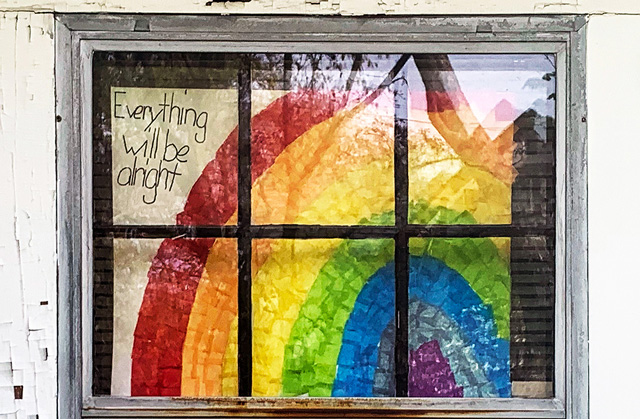COVID-19 Mental Toll

May 2 in downtown Yonkers, NY.
By Christian Fitch
I’m nervous every day when my essential worker fiancé gets ready for work. Is this the day he will come back home feeling ill? Will he bring this virus home to our children? Will my 67-year-old neighbor, who suffers from COPD, contract it because she utilizes the same elevator? As someone who suffers from panic attacks, I stay away from the news and conspiracy theorists on Facebook. Friends are constantly posting about the loss of a loved one or the hurt they are experiencing.
Recovering from mental health stress caused by the COVID-19 pandemic will likely be a long journey for many, a crisis after a crisis. That’s what some experts are calling the aftermath of the COVID-19 pandemic. People will continue to suffer because of the loss of jobs, the passing of loved ones and even failed relationships. Divorce rates in China have increased substantially after people were ordered to lock down. Deborah Tannen, a professor of linguistics at Georgetown, suggests that some things will never be the same. “People will begin to refrain from shaking hands or touching their faces and we might all find we can’t stop washing our hands,” she posted on Facebook as one of many surveyed by Politico about the impact of virus.

May is Mental Health Awareness month.
Mental health professionals believe that social distancing measures, which may be required even after the COVID-19 crisis passes, will increase mental health illnesses globally. Emily Roberts, a New York City-based psychotherapist frequently posts short videos on Instagram encouraging people to make the effort to call those who might be negatively affected by isolation. She believes doing “social welfare” checks will help people dealing with the impacts of social distancing.
During strict lock down, people have been unable to visit their therapists. Online platforms like Talk Space, an online therapy site, allow people to video chat or call therapists. However, some insurance companies will only pay for in-person meetings and many people who have been laid off or lost a job due to the COVID-19 pandemic simply can’t afford it. Fifty-four percent of people who have lost a job due to the pandemic say that their mental health has been impacted negatively, according to a poll by the Kaiser Family Foundation Health Policy Research. Regain, another online therapy site, offers financial aid to people who cannot afford to pay in full for the cost of therapy.
Many New Yorkers have been consumed with the idea of life going back to “normal” but, for those who lost a loved one, things won’t be the same. Angela Wong, a blogger on Instagram and high school acquaintance, recently posted that she lost her father-in-law due to the coronavirus. “Dad, I can’t put into words what this pain and emptiness feels like, but I’ll try to shift my focus because everyone should know you were one in a million.” He was a retired cop and received a lot of praise from the community after losing his battle to COVID-19. “It is hard not seeing him in his chair he was so full of life even at 67,” said Wong. “We have strength because he was so loved by our community.”
Angela is one of thousands of people who have lost someone due to the virus. Over 65,000 Americans have died as of May 1. Another group that is hard hit are health care workers who are fighting the virus on the frontlines. They have lost friends, colleagues cite the number of deaths and many have the added pressures of telling families their loved ones didn’t make it. A study by JAMA Network Open revealed that 1200 healthcare workers from 34 hospitals in China who were caring for COVID-19 patients suffered severe mental health problems.
The study found that women in the healthcare field were more impacted than men. Overall both men and women suffered from anxiety, depression and psychological distress. Yajaira Marcelino, a medical assistant at West Med in Yonkers, explained how she stays focused under the circumstances. “I honestly have to keep it together for my family even if I am afraid, I have to work we still have to eat,” said Marcelino.
Many healthcare workers have accepted that it is inevitable that they will become sick, according to a survey by 9news.com. “I think most of us millennial physicians are less worried about ourselves getting sick, we have basically accepted it’s going to happen at some point,” said one doctor in the survey. It also revealed that 79 percent of hospital workers don’t have enough equipment like masks and ventilators. Inadequate equipment ratchets up the stress for health care workers, says Jessica Gold, a psychiatrist who is currently studying the COVID-19 pandemic’s effects on healthcare workers.
University of North Carolina at Chapel Hill and the University of California San Francisco have recruited psychiatric volunteers. The UCSF website has a section dedicated to frontline providers that are in need of extra psychological support during these times. It also offers a weekly webinar series, a crisis hotline, medications if needed and educational materials on understanding and coping with stress.
The University of Washington’s Center for the Science of Social Connection studies human relationships and clinical depression. In an article “Social distancing comes with social side effects-here’s how to stay connected,” Jonathan Kanter, the director of the center for the Science of Social Connection, and Adam Kuczynski, a Ph.D student, write “Human beings are social beings and, in times of stress and illness, being deprived of social connection can create more illness.”
Saved under Coronavirus, Featured Slide, News
